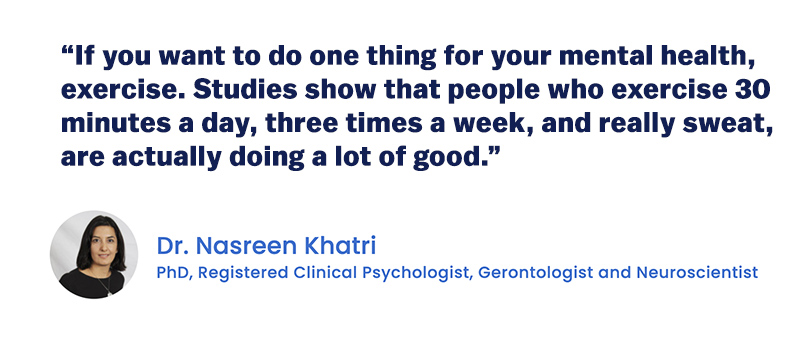Exercise and Endorphins: How Physical Activity Improves Mood
Exercise and Endorphins: How Physical Activity Improves Mood
After a long day at work, you’re determined to shake off the stress and tension weighing you down. So, you decide to get moving – whether it’s going for a walk, doing some yoga, or hitting the gym. Within minutes, you notice a shift in your mood as you release endorphins into your system.
If this sounds familiar, you’re aware of the undeniable connection between physical activity and improved mood – a link that applies no matter your preferred type of exercise. It’s no secret that exercise has significant physical benefits, but it also has an incredible impact on mood and overall mental wellbeing.
How exercise can improve mental health
Our mood is intricately linked to our mental health. The way we feel throughout the day dictates our emotions and how we interact with others.
Given this close relationship between mood and mental wellbeing, it’s no surprise that exercise can positively impact both. Dr. Nasreen Khatri, Ph.D., is a registered clinical psychologist, gerontologist, and neuroscientist. She is also among the roster of experts leading thousands of microlearnings available on LifeSpeak Mental Health and Resilience, a product of LifeSpeak Inc. In one video titled “Protective Lifestyle Factors for Mood Disorders,” Dr. Khatri explains how exercise improves mental health.
“If you want to do one thing for your mental health, exercise,” says Dr. Khatri. “Studies show that people who exercise 30 minutes a day, three times a week, and really sweat, are actually doing a lot of good.”

Sweating is a sign that your exercise is raising your heart rate and putting stress on your body. When you exercise at this level of intensity, it triggers important physiological responses in the body. This includes the production of endorphins in your brain, acting as the natural “feel good” hormones that elevate your mood and affect your emotional state. Your cortisol levels also decrease, helping to mitigate anxiety.
Tom Toth is a movement specialist and fitness expert with LifeSpeak Mental Health & Resilience. In one expert blog post, he shares insights on movement and mood. In “Your Brain Wants You to Move! The Mental Health Benefits of Exercise,” Toth says exercise is equally important to your mental wellbeing and physical health.
“The mental health benefits of exercise are just as important as the physical benefits,” says Toth. “Whether you are fighting depression, anxiety, or stress, exercising can help. It’s never too late to start.”

“Your Brain Wants You to Move! The Mental Health Benefits of Exercise” by Tom Toth.
Interestingly, research shows that exercise can also act as a natural antidepressant that impacts your mood in a similar (and complementary way) to medication. A study by Harvard Medical School in February 2021 reveals that while antidepressant medication is a common treatment for 1 in 10 adults living with depression in the US, exercise can be as effective as a treatment in some cases.
“What’s good for your heart is good for your brain, and it’s good for your mood; in fact, studies show that exercise can be as potent as antidepressant medication for mild to moderate depression,” says Dr. Khatri.
Beyond improved mood, regular exercise can also boost self-esteem, confidence, and body positivity.
A great way to increase self-esteem through exercise is to participate in group sports or activities. Being a part of a sports team, fitness class, or other group activity provides an opportunity for strengthening in-person human connections and social support. Interacting with others releases oxytocin, the “love hormone,” which also counters stress. Strong social bonds are crucial for mental health.
Improving cognitive functioning with exercise
Cognitive health is also closely tied to mood, and like mood, benefits from regular exercise. Mental health encompasses emotional wellbeing, while cognitive health specifically refers to the overall functioning of the brain, including aspects like memory, focus, learning, and productivity.
“We now know that the hippocampus, which is part of the brain involved in new learning, memory, and mood, can grow new cells through exercise,” says Dr. Khatri.
Exercise improves cognitive health by enhancing the ability to stay focused, energized, and be more productive during the day.
In need of a good night’s sleep? Exercise improves sleep quality, which impacts mood and improves cognitive functioning.
“A major benefit of exercising regularly is that you get an improvement in sleep,” says Toth. “Physical fatigue is a good way to prepare for a more restful slumber.”
Dr. Khatri explains that sleep quality is vital because it significantly affects your mood and your cognitive health.
“Sleep is very important because it’s tied to mood and it can be tied to cognitive problems later in life,” says Dr. Khatri. “We know that people who have midlife problems with mood and anxiety that go untreated are actually at risk for developing dementia at twice the rates of people who don’t have those problems.”
Toth says good sleep quality results in a healthy cycle of continuous improved mood.
“When you sleep better, you enter a positive feedback loop,” says Toth. “Good sleep not only improves your mindset directly, but it makes it easier to eat better, focus more and be present for your work and family. These positive changes then make it easier to exercise, which results in better sleep!”
Incorporate exercise into a busy schedule
How do you integrate regular exercise seamlessly into a busy schedule? While it may seem challenging to fit a workout into your day, planning and commitment can help you stick to your new routine. Here are three practical tips to help you incorporate exercise into your schedule:
Prioritize workouts
Just like any other important task, make exercise essential to your day. Set aside a specific time slot for an activity and commit to it regularly. This could be walking to work or running errands when possible, fitting in some exercise over the lunch hour, or hitting up a yoga or movement class with a friend instead of coffee.

Keep yourself accountable
Have a workout partner – whether it is a colleague, friend, or family member. They can help provide motivation
and make working out more enjoyable. Additionally, be realistic about your exercise regimen and set manageable goals for yourself. As you build consistency in your routine, gradually increase the intensity and duration.
Use technology
Explore fitness apps or online exercise videos that offer flexible workout options you can follow from home or the office. Workplace wellness benefits are great resources for finding programs or activities to help improve physical and mental wellbeing. For example, Wellbeats Wellness, a product of LifeSpeak Inc., offers on-demand classes and programs to its members. Regardless of age, fitness level, or interest, there are thousands of exercises and activities to choose from. Some of the most popular workout programs over the past year are those that cater to people with busy schedules, such as “Express,” “Connect,” and “Office Breaks,” all of which can be completed from anywhere in under 20 minutes!
Harness exercise to improve your mood
Making physical activity a regular part of your life requires dedication, but the payoffs are well worth it. Both short and long-term, exercise provides benefits that extend far beyond just physical health. As the research shows, it also nourishes mental wellbeing and cognition.
Regular workouts have been shown to bolster mood through concrete changes in brain chemistry over time. Digital tools now make it simpler than ever to prioritize fitness, whether at home or on the go. Resources like LifeSpeak Mental Health & Resilience and Wellbeats Wellness offer evidence-based ways to support emotional and physical wellness.
If you’re an employer seeking additional benefits to help your workforce stay energized and healthy, request a demo today.
